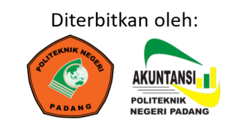Penerapan E-Learning ¬Platform Google Classroom Untuk Menjawab Tantangan Revolusi Industri 4.0
Abstract
This research is motivated by a change in the learning system as a result of the 4.0 industrial revolution. This research uses the theory of Technology Acceleration Model (TAM) developed by Fred. D. Davis in 1986. The purpose of this study was to investigate the application of the Google classroom e-learning platform to answer the challenges of the Industrial Revolution 4.0. in Accounting Department in the Polytechnic of Padang. Data gethered using a questionnaire. The population of the study were active students in the Accounting Department of the State Polytechnic of Padang in the 2018/2019 school year with cluster sampling and 241 respondents. The results of this study indicate that perceived usefulness has a positive and significant effect on student interest in using google classroom, and perceived ease of use has a positive and significant effect on student interest in using google classroom. Based on the results of this study indicate several things that must be considered by the Accounting Department of the Padang State Polytechnic before applying the use of technology.
References
Allen, Michael. 2013. Michael Allen’s Guide to E-learning. Canada : John Wiley & Sons.
Ardiansyah, Ivan. 2013. Eksplorasi Pola Komunikasi dalam Diskusi Menggunakan Moddle pada Perkuliahan Simulasi Pembelajaran Kimia. Bandung: Universitas Pendidikan Indonesia.
Davis, F. D. (1989). Perceived usefulness, perceived ease of use, and user acceptance of information technology. MIS Quarterly, 13(3), 319-340.
Laudon, Kenneth C & Laudon, Jane P. 2014. Sistem Informasi Manajemen: Mengelola Perusahaan Digital Edisi 13. Jakarta: Penerbit Salemba Empat.
Lee, J., Lapira, E., Bagheri, B., Kao, H., (2013). Recent Advances and Trends in Predictive Manufacturing Systems in Big Data Environment. Manuf. Lett. 1 (1), 38–41.
Liffler, M., & Tschiesner, A. (2013). The Internet of Things and the Future of Manufacturing. McKinsey & Company.
Nazar, M. Rafki. 2008. Cognitive Vs Personality Terhadap Niat Pengguna Teknologi (internet). Materi SNA Pontianak, 22-25 Juli 208.
Saifudin, Fuad (2017) E-Learning dalam Persepsi Mahasiswa
Suardikha, Sadha. 2012. Pengaruh Implementasi Budaya Tri Hita Karana Terhadap Penggunaan Sistem Informasi Akuntansi Dimediasi Keyakinan Diri Atas Komputer, Keinovatifan Personal, Persepsi Kegunaan, dan Persepsi Kemudahan Penggunaan Pada Bank Perkreditan Rakyat di Bali (Studi pada Bank Perkreditan Rakyat di Provinsi Bali), Materi SNAXV Universitas Lambung MangkuratBanjarmasin. 20-23 September 2012.
Sukartono. (2018). Revolusi Industri 4.0 dan Dampaknya terhadap Pendidikan di Indonesia










